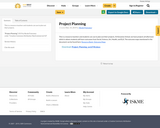
This is a resource teachers and students can use to plan out their projects.
- Subject:
- Arts Education
- English Language Arts
- Health & Fitness
- Health Education
- Science
- Social Studies
- Material Type:
- Teaching/Learning Strategy
- Date Added:
- 11/13/2019

This is a resource teachers and students can use to plan out their projects.
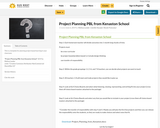
This is a template for planning project based learning in your classroom.
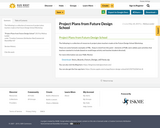
The following is a collection of resources & project plans teachers made at the Future Design School Workshop.
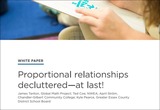
This article attempts to declutter proportionality by having students think about varying quantities and to investigate patterns so they can describe quantities in terms of proportional relationships. Students encounter proportional relationships in their everyday world, and the article provides examples of where these relationships surface and how we can approach building strong ways of thinking. The power of modeling with mathematics is highlighted.

Andrea Kowalchik has her students move around the room in pairs while solving proportion problems that are tacked to the walls. This lesson is easy to prepare, fun for students, and gets them working quickly while being active all at the same time.

Supporting First Nations, Métis and Inuit Youth to make Positive Changes in
their Communities: A Guide for Educators and Youth Program Facilitators
Students will learn ‘through’ the development and implementation of their action projects, rather
than ‘about’ action.
Action projects develop the knowledge, skills and attitudes that are central to many youth
programs. Action projects:
• develop communication skills
• foster critical thinking skills
• promote leadership skills
• help young people to identify things that are important to them and support them to think
through the process required to make positive change
• offer opportunities for young people to experience meaningful success
• offer youth an opportunity to learn about and understand FNMI spiritual teachings, including
the teaching that all living beings have a Spirit
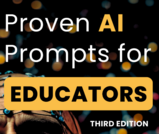
Explore these 40 proven AI prompts for teachers from The AI Classroom book for free.
Please keep in mind that nothing replaces you and your professionalism as an educator. Make sure you add your personal touch and align AI generated materials to your students' needs and your teaching style.
Prompts for: task creation, lessons, scaffolding, risk assessments, feedback, how to guides, vocabulary, differentiation, debates, writing revolution sentence activities (because, but, so), misconceptions and more.
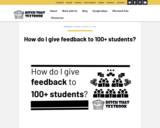
This resource from Ditch That Textbook looks at assessment and how we can provide feedback in the most manageable, effective and efficient way possible.
Find great examples and strategies in the following areas:
- Whole-class feedback
- Triaged feedback
- Student self feedback
- Peer feedback

TED Studies, created in collaboration with Wiley, are curated video collections 逖 supplemented by rich educational materials 逖 for students, educators and self-guided learners. In Understanding Happiness, expert explorers of the mind chart our understanding of how happiness is created and cultivated. Their insights challenge our most basic cultural, political and economic assumptions and are transforming the field of psychology.
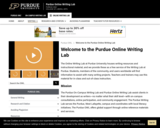
The ultimate go-to for resources and instruction on writing.
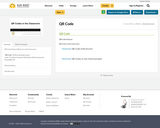
QR Code Podcast
QR Costs in the Classroom
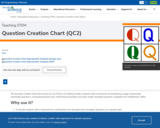
What is a Question Creation Chart (QC2)?
The Question Creation Chart (also known as a Q-Chart or Q-Matrix) provides students with a framework for developing a range of personally meaningful questions, encompassing both close-ended factual questions and open-ended, divergent questions. (Adapted from Weiderhold, 1997).
Why use it?
To provide students with a framework for creating their own divergent and convergent questions on a specific topic.
To encourage students to think deeply about a topic.
To help students strengthen their understanding and comprehension of a topic.
To stimulate students’ prior knowledge about a topic.
To collect information about students’ knowledge and understanding of a topic.
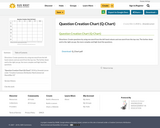
Directions: Create questions by using one word from the left hand column and one word from the top row. The farther down and to the right you go, the more complex and high-level the questions.

QuestionWell provides an unlimited array of questions, allowing teachers to concentrate on what truly matters. Simply enter some text, and the AI will generate key questions, learning objectives, and corresponding multiple-choice questions.
Here's how it works: Paste your reading material, specify a topic, and include any learning objectives or standards. The AI will then produce learning objectives and questions that you can easily export.
*Exports to Moodle
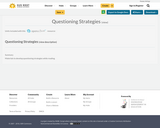
Materials to develop questioning strategies while reading.
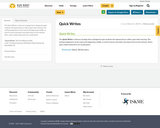
The Quick Write is a literacy strategy that is designed to give students the opportunity to reflect upon their learning. This writing assignment can be used at the beginning, middle, or end of a lesson and takes only about three to five minutes. Short, open-ended statements are usually given.
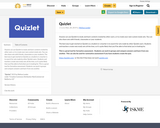
Anyone can use Quizlet to study and learn content created by other users, or to create your own custom study sets. You can also share sets with friends, classmates or your students.
The best way to get started on Quizlet as a student or a teacher is to search for sets made by other Quizlet users. Students and teachers create new study sets all the time, so it's quite likely that you'll be able to find what you're looking for.
This is a great tool for formative assessment. Students can work in groups and compare answers and learn from one another.
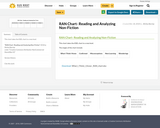
This chart takes the KWL chart to a new level.

Students can be motivated to improve classroom behaviors if they have both a clear roadmap of the teacher's behavioral expectations and incentives to work toward those behavioral goals. This modified version of Check-In/Check-Out (CI/CO) is a simple behavioral intervention package designed for use during a single 30- to 90-minute classroom period (Dart, Cook, Collins, Gresham & Chenier, 2012). The teacher checks in with the student to set behavioral goals at the start of the period, then checks out with the student at the close of the period to rate that student's conduct and award points or other incentives earned for attaining behavioral goal(s).

The Color Wheel is one solution that enforces uniform group expectations for conduct while also responding flexibly to the differing behavioral demands of diverse learning activities. This classwide intervention divides all activities into 3 categories and links each category to a color: green for free time/ low-structure activities; yellow for large- or small-group instruction/independent work; and red for brief transitions between activities. The student learns a short list of behavioral rules for each category and, when given a color cue, can switch quickly from one set of rules to another.